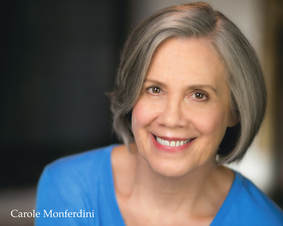 Help us keep our work going! Just $10 makes an enormous impact on our work. Click here to donate to the Write For Women Campaign. Carole Monferdini's career highlights include long runs in three Off-Broadway hits, an OBIE award for playing a man, standing by for Dame Diana Rigg with the National Theatre of Great Britain, playing a vampire with Charles Busch’s Theatre in Limbo, performances in two separate one-woman plays (one as the cosmopolitan fashion and trend-setter Diana Vreeland and the other as an 87-year-old woman in a small Southern town). She was one of the seven Women of Corinth in Euripedes’ Greek tragedy, Medea, and one of the four gents in the first play ever directed by Tommy Tune. She has read plays by and for both Edward Albee and Vaclav Havel, along with many other playwrights both known and as-yet-undiscovered. She has acted in regional theatres in twenty-two states, appeared in dozens of commercials, a couple of “soaps” and several films. She is a member of The Ninth Floor, a founding member of Abingdon Theatre Company and a newly inducted member of The Actors Center. She can saddle up and go full gallop on a horse and thinks it’s all been a pretty good ride so far. Tell us about your experience(s) reading with the Bechdel Group. I have been coming to Monday night readings at Jimmy's for about a year now. It's always fun and exciting to hear short plays or snippets of longer pieces read as they are being developed. I think I have read all types of roles, gender and age-wise -- although, of course, I usually read--ah hem!--"mature" women. Sometimes I have that afternoon to look over what I'll read, sometimes just the half hour before we get started and sometimes on the spot. It's always fun, no matter what. When in your acting career/work did you become aware of the Bechdel test and how has it changed or informed your work? I have to admit that I really only became aware of the Bechdel test in the past year or so that I have been involved with the Bechdel Group's readings. Even though I have long considered myself a feminist and aligned with feminist thinking, it was this group who brought this litmus test to my attention. To be honest, I don't think it has changed my work that much at this point. Let's face it--I'm an older actress and have been playing mothers for many years now. Plus I was always a bit of a character actress so the sexual element was never that great a component in the roles I've played, to be honest. But I do have to admit that, as much as I would love to stay young & lovely forever, I was actually relieved to move on into the other types of roles as I aged. As the likelihood of being asked to disrobe or play a sex scene receded, I was mightily liberated. As you know, the Bechdel Group’s monthly readings are not rehearsed – and while they are put together for playwrights to hear their work in development – what do you like about this kind of format and what do you, as an actor, get from it? As an actor, this format is a lot of fun for me. I always spend a lot of time preparing when I have a script in advance -- be it an audition or the first day of rehearsal for a play. But I also just love to "wing it", with all sides understanding the rules of the game. I think that first impulses are powerful and should not be discounted. Have you ever been cast outside of what you consider to be your marketable “type” at a Bechdel reading? How was that for you? I am usually cast within my age range at Bechdel readings, but not always. And that's no problem at all for me. I love it! I'm game to read any age group, gender or type. We're here to hear the playwrights' writings but as long as everyone is game--which it seems to me they are in this format--then I think it's great. Playwrights always appreciate the feedback they get from the actors at our readings. What would the perfect collaboration on a play’s development look like from your perspective as an actor? I always think that the greatest feedback I can give a playwright is my reading of a part in their play and what they will derive from just hearing what I hope is a good solid reading of what they have written. I do not pretend to be a dramaturg so I leave that to others. But I can tell them where I was perhaps confused or didn't feel I picked up on what their intent was (which may indicate they need to clarify what they've written) and I can tell them what I tracked and what I personally felt was compelling. As far as construction, I leave that to other playwrights.
0 Comments
Leave a Reply. |
The Bechdel Group
Working to challenge the portrayal of women in film and on stage. Archives
June 2019
Categories
All
|
 RSS Feed
RSS Feed